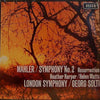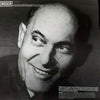



Mahler - Symphony N° 2 Resurrection - Helen Watts, Georg Solti & The London Symphony Orchestra (2LP)
RARITY - Sealed
Gustav Mahler - Symphony N° 2 In C Minor "Resurrection"
Contralto Vocals – Helen Watts
Soprano Vocals – Heather Harper
London Symphony Chorus
Chorus Master – John Alldis
The London Symphony Orchestra
Conductor – Georg Solti [click here to see more vinyl featuring Georg Solti]
2 LPs, gatefold jacket
Original analog Master tape : YES
Heavy Press : 180g
Record color : black
Speed : 33 RPM
Size : 12'’
Stereo
Studio
Record Press : Pallas
Label : Speakers Corner
Original Label : Decca
Recorded in May 1966 at Kingsway Hall, London.
Produced by David Harvey
Originally released in 1966
Reissued in 1998
Tracks :
Side A:
- Allegro Maestoso
Side B:
- Andante Moderato
- In Ruhig Fliessender Bewegung
Side C:
- Urlicht, Sehr Feierlich, Aber Schlicht
- Im Tempo Des Scherzo (To Fig. 29)
Side D
- Im Tempo Des Scherzo (Conclusion)
Reviews :
"From the very start of the first movement we are in a different world to what we have heard so far. The start is razor -sharp, explosive and angry and puts me in mind of the opening of Wagner's Die Walkure. Not far from the truth since Solti was recording The Ring around this time. It's a feeling and mood that will stay right through the first movement and also the rest of the symphony. There is real drive in this music under Solti. Everything restless and shifting, always on the edge. Music taken by the scruff of the neck and shaken. Even the lyrical passages seem like prayers in the midst of terror. There is great playing in every department and this is delivered by a recording that is fierce, clear but compartmentalised and with little air around the instruments but that suits Solti's approach. The headlong dash to the recapitulation crisis is terrifying indeed, with the blaze of the brass hitting right between the eyes, the chords crashing down like explosions, brassy and sharp. In many ways I do admire the way Solti maintains his angry sharpness of focus, especially in the lyrical passages. The problem is that it seems very far from any idea of funeral rites. This abrasive approach allows little or no subtlety and means we are forever on our toes. No mean achievement if that were appropriate, but it isn't. There are passages when the music needs to relax and reflect. Under Solti there is little opportunity for this.
The opening string passage of the second movement is consciously moulded, with every dynamic brought out as though in a pin-sharp colour photograph. There is no denying a certain amount of conscious moulding adds to the music, but when the double basses suddenly leap out from the texture you begin to realise the hand is too strong. Then in the animated central section we are almost back to the shifting and thrusting maelstrom of the first movement. This is drama in the extreme again and too muscular in what should be a rest from struggles past and struggles to come. Solti's approach works better in the third movement. There are some lovely woodwind interjections, great col legno snaps of wood on strings and the dynamic contrasts bring out well the sourness. The middle section is superbly cutting also and profoundly dramatic with piercing trumpets and a feeling of the world spinning out of control. In the fourth movement "Urlicht" Helen Watts may be the best mezzo soloist of all and she preludes the fifth movement unforgettably. Here the opening has a terrific sense of release and heralds the best of Solti's recording. He's very aware of the theatrical nature of the movement. Never more so than in the passage near the start of the voice in the wilderness passage a few minutes in where appropriate tension is palpable. With the first appearance of "Oh glaube" there is a firm architectural control also with each step firmly marked and the tension ratcheted up as we approach the solemn announcement on brass that will explode into fanfares. This is held back just enough to sound really portentous with a wonderful "luftpause" before the low brass intone the chorale and only when the fanfares and brass bursts out with cymbals is the picture complete. The great percussion crescendi to herald the march are like aural flame-throwers and the march itself, though on the quicker side, because of Solti's concern for clarity, especially in the strings, maintains considerable weight. I also liked his handling of woodwind and brass. Shrieking high woodwind and blazing horns are especially fine but the collapse at the end is a disappointment. I've heard more sense of disintegration but much is redeemed by the Grosse Appell which the Decca engineers in the old Kingsway Hall managed with breathtaking ease. Solti despatches "Aufersteh'n" with too much efficiency to my liking. There's a calculated feel to the singing and to the orchestral coda. At the end, Solti, as so often, seems too interested in delivering a well-engineered piece of machinery, impressive in its itself but failing to reach deep. What he does do in the whole work is transcend to a certain extent any studio-bound feeling. He does this by creating his own brand of tension but one which I think fails to take into account every aspect of the work. This is a fine recording of a particular interpretation and there are times when I could think that it would do very well, but there is much more to be gained from this music. I include it here because as a visceral experience it still thrills and moves.” Music Web International
Ratings :
Discogs :

